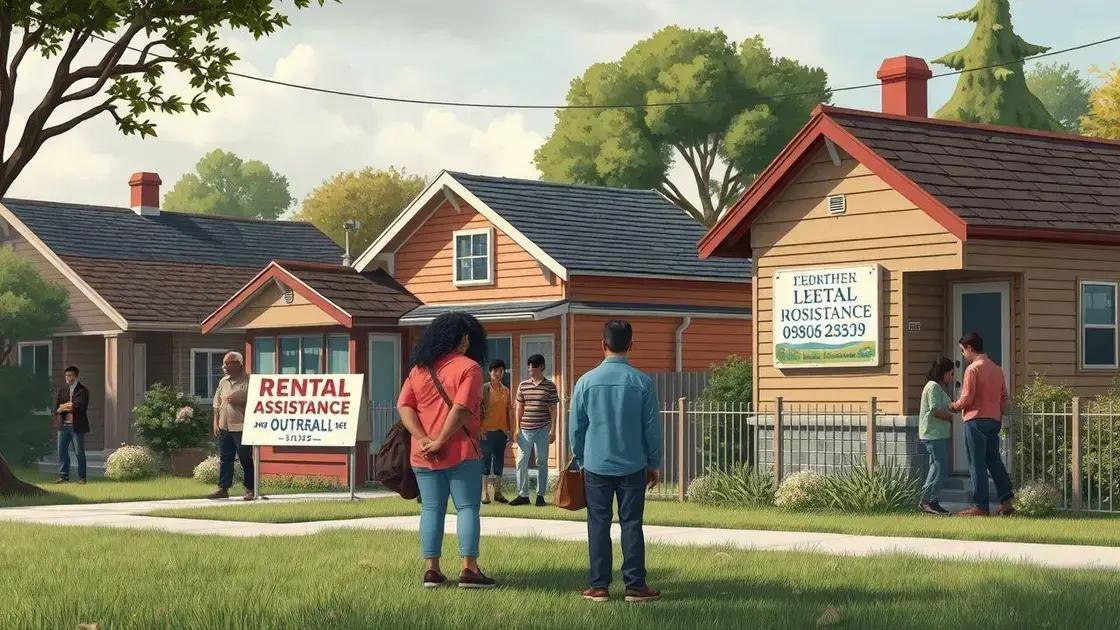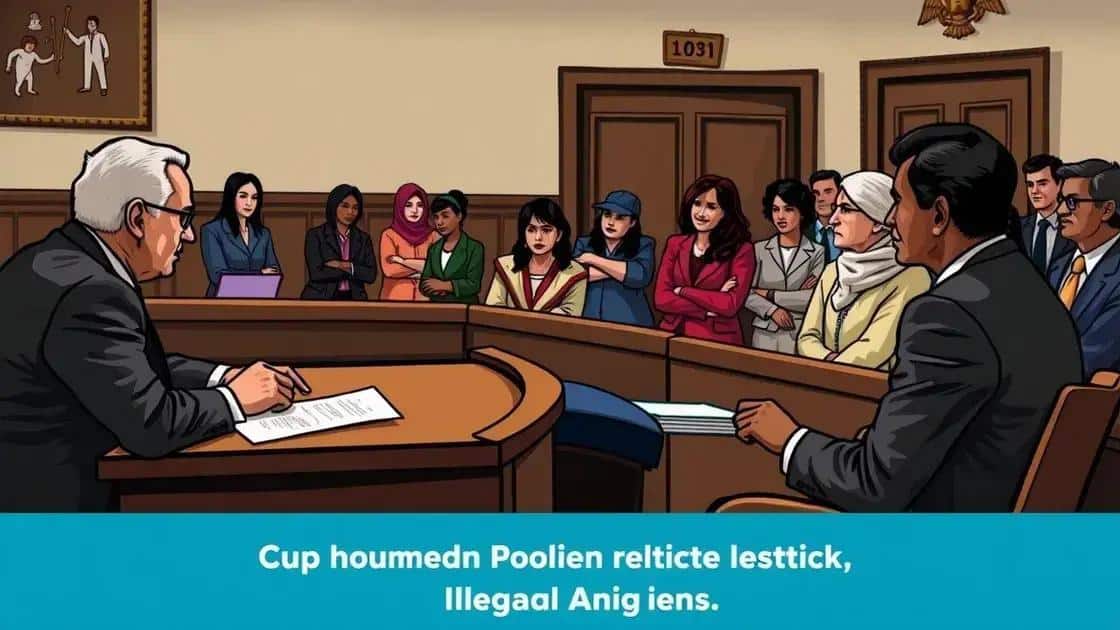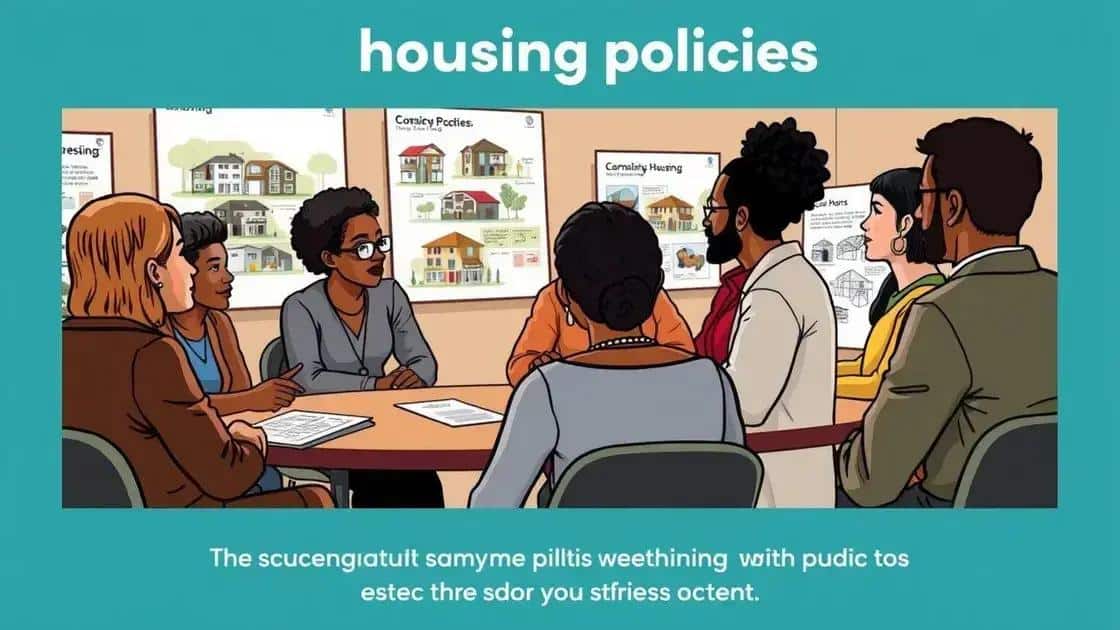DHS and HUD end taxpayer-funded housing for illegal aliens
Anúncios
DHS and HUD are implementing changes to end taxpayer-funded housing for illegal aliens, which will impact access to housing resources and shift community discussions about support and responsibility.
DHS and HUD end taxpayer-funded housing for illegal aliens raises critical questions about the future of housing assistance. What does this mean for taxpayers and those affected? Let’s dive into this issue and explore the implications together.
Understanding DHS and HUD’s roles
Understanding the roles of DHS (Department of Homeland Security) and HUD (Department of Housing and Urban Development) is essential to grasp the new housing policies. These agencies play crucial parts in shaping how housing resources are allocated, especially concerning illegal aliens.
The DHS is tasked with ensuring public safety, while HUD focuses on fair housing practices. Their collaboration has increasingly become a topic of discussion as they address the complexities around illegal immigration and taxpayer-funded housing.
The DHS’s Role in Housing
The DHS has moved to restrict access to housing benefits for illegal aliens. This decision influences a wide range of issues, including:
-
📰 Public perception of illegal immigration
-
🏠 The effectiveness of housing assistance programs
-
💰 Financial implications for taxpayers
The HUD’s Responsibilities
On the other hand, HUD’s mission centers on promoting homeownership and ensuring equal housing opportunities. However, their guidelines have often been scrutinized when it involves illegal aliens. Some of the key responsibilities of HUD include:
- Enforcing housing discrimination laws
- Distributing housing grants
- Implementing programs for low-income families
The interplay between these agencies is pivotal. Each agency’s policies can either complement or contradict the other, leading to ongoing debates. When DHS restricts housing access for illegal aliens, HUD must adapt its programs to comply with these directives. The ramifications of these changes can deeply impact communities reliant on housing assistance.
As society grapples with these shifts, understanding the distinct roles of DHS and HUD becomes increasingly important. These changes resonate beyond policy, affecting real lives and communities.
Impact on illegal aliens and housing

The impact on illegal aliens and housing is significant as policies shift. Changes in laws and regulations can create barriers for those who are undocumented. As new guidelines emerge, individuals face challenges in accessing safe and affordable housing.
Many illegal aliens depend on rental assistance and public housing programs. With the recent changes, access to these resources may become limited. This leads to uncertainty about future housing security for these families.
Key Challenges Faced by Illegal Aliens
Some challenges that arise include:
- Increased risk of eviction from their homes
- Difficulties in obtaining housing documentation
- Fear of legal repercussions when applying for assistance
In light of these challenges, illegal aliens may find themselves in precarious living situations. Some may turn to informal housing arrangements or overcrowded homes, which can lead to health and safety issues.
Consequences of Limited Housing Access
When illegal aliens struggle to find housing, it does not only affect them but also the communities around them. Issues such as:
- Higher rates of homelessness
- Increased strain on social services
- Potential conflicts within neighborhoods
These developments raise questions about how society views undocumented immigrants. The ongoing policy changes make it crucial to understand the broader effects on communities and the individuals within them. As both housing and immigration policies evolve, compassion and understanding become more important in addressing these urgent issues.
Taxpayer funding implications
The implications of taxpayer funding in the context of housing for illegal aliens are significant and complex. As funding shifts, understanding how taxpayer dollars are allocated becomes crucial.
When governments decide to restrict housing benefits for illegal aliens, it directly influences how taxpayer money is spent. This policy change raises questions about fairness and the role of public funds in addressing housing needs.
Effects on Housing Programs
Taxpayer funding is often used to support various housing programs. Changes in eligibility criteria can lead to:
-
📉 Reduction in available resources for low-income families
-
🏘️ Increased competition for affordable housing
-
🏥 Potential strain on community services
As a result, the shift in funding priorities affects not only illegal aliens but also citizens in need of assistance. Many low-income families may find it harder to access the support they require, leading to overall instability in housing markets.
The Debate Around Taxpayer Money
Public opinion on the use of taxpayer funds for housing programs can be highly polarized. Some argue that these funds should prioritize citizens, while others believe in the necessity of supporting all residents regardless of legal status. This ongoing debate raises important issues about fairness and the social contract.
Understanding these implications is vital, as they guide policymakers in making informed decisions. As they consider budget allocations, the balancing act between supporting community needs and addressing legal concerns becomes increasingly evident.
Legal challenges and responses

Legal challenges surrounding housing policies for illegal aliens are becoming more prominent. As the government enforces new regulations, various legal battles arise, impacting both individuals and communities.
These challenges often stem from claims that new policies violate rights or fail to adhere to established laws. Understanding these conflicts helps clarify the implications of housing decisions made by federal and state agencies.
Common Legal Arguments
Several common legal arguments emerge in these cases:
- Violation of civil rights, particularly regarding access to housing
- Claims of discrimination based on immigration status
- Challenges to the legality of funding restrictions
Each of these arguments seeks to protect the rights of individuals affected by policy changes. Attorneys and advocacy groups often rally to challenge decisions they see as unjust.
Government Responses to Legal Challenges
In response to these challenges, government agencies have various strategies. They may conduct legal reviews or amend policies to comply with court decisions. These responses can reshape housing policies, particularly how they affect illegal aliens.
The outcome of these legal battles has broader implications. Successful challenges could lead to the reinstatement of housing benefits, while setbacks may tighten restrictions even further. As these issues develop, it is crucial for communities to stay informed about ongoing legal proceedings and their potential impacts.
Public opinion on the changes
Public opinion on the changes regarding housing policies for illegal aliens is varied and often heated. Many individuals have strong feelings about how taxpayer dollars should be used, creating a complex landscape of perspectives.
Some advocate for strict restrictions on housing benefits for undocumented immigrants, believing that resources should prioritize citizens and legal residents. They argue that these changes will better ensure that housing assistance goes to those who have contributed to the system.
Supporters of Restriction
Supporters of these changes often mention points such as:
-
💸 Profitability of taxpayer resources for citizens
-
🚫 Reducing dependency on government assistance
-
🛂 Encouraging legal immigration pathways
On the other hand, many individuals and organizations advocate for the rights of illegal aliens, arguing that everyone deserves access to safe housing, regardless of their immigration status. These advocates emphasize the humanitarian aspects of the issue.
Views of Advocates
Those who oppose strict restrictions often cite:
- The moral obligation to help those in need
- Economic benefits of having a secure, housed population
- Potential negative impacts on family unity
The divide in public opinion showcases different values and priorities. As housing policies evolve, these voices contribute to the larger discussion and shape future legislation. Media coverage plays a crucial role in informing the public and collecting varying opinions on the topic.
Future housing policies and reforms

Future housing policies and reforms will likely focus on balancing the needs of illegal aliens with those of citizens. As the political landscape evolves, new strategies may emerge to address these complex issues.
One key area of reform is the allocation of resources. Policymakers might look into creating more inclusive programs that provide assistance without discrimination. This change can help ensure that all residents have access to safe housing.
Potential Policy Directions
Several potential directions for future housing policies include:
- Expansion of support programs for low-income families
- Development of mixed-income housing to promote community integration
- Increased funding for legal aid services for undocumented individuals
These initiatives could provide significant benefits to both communities and individuals by fostering inclusivity and support. Additionally, enhancing collaboration between local governments and non-profits can lead to innovative solutions to housing problems.
Community Involvement
Engaging the community in the policy-making process will be essential in shaping future reforms. By incorporating feedback from residents, policymakers can create housing strategies that reflect the needs and values of diverse populations. Hosting forums and discussions can also help bridge gaps in understanding and build consensus.
As discussions around future housing policies grow, it will be important to remain focused on fairness and accessibility. The ongoing dialogue about the role of immigrants, particularly illegal aliens, in housing initiatives is crucial for progress.
FAQ – Frequently Asked Questions about Housing Policies for Illegal Aliens
What are the current housing policies for illegal aliens?
Current housing policies are evolving to restrict access to taxpayer-funded housing for illegal aliens while aiming to balance community needs.
How do these policies impact undocumented individuals?
These policies can limit access to safe housing, increasing the risk of eviction and homelessness for undocumented individuals.
Why is community involvement important in housing policy discussions?
Community involvement ensures that diverse voices are heard, leading to more effective and inclusive housing solutions.
What should taxpayers know about funding for housing programs?
Taxpayers should be aware that funding decisions can impact both legal residents and illegal aliens and should advocate for fair and responsible resource allocation.






